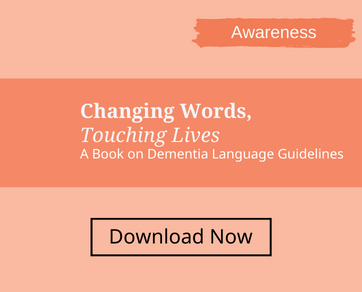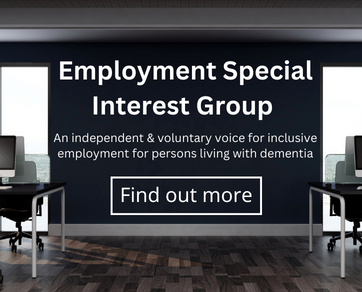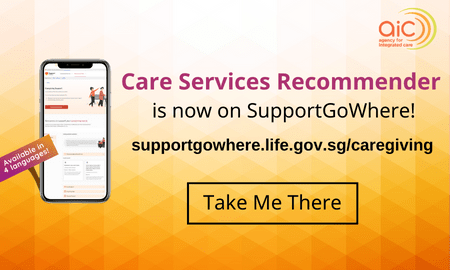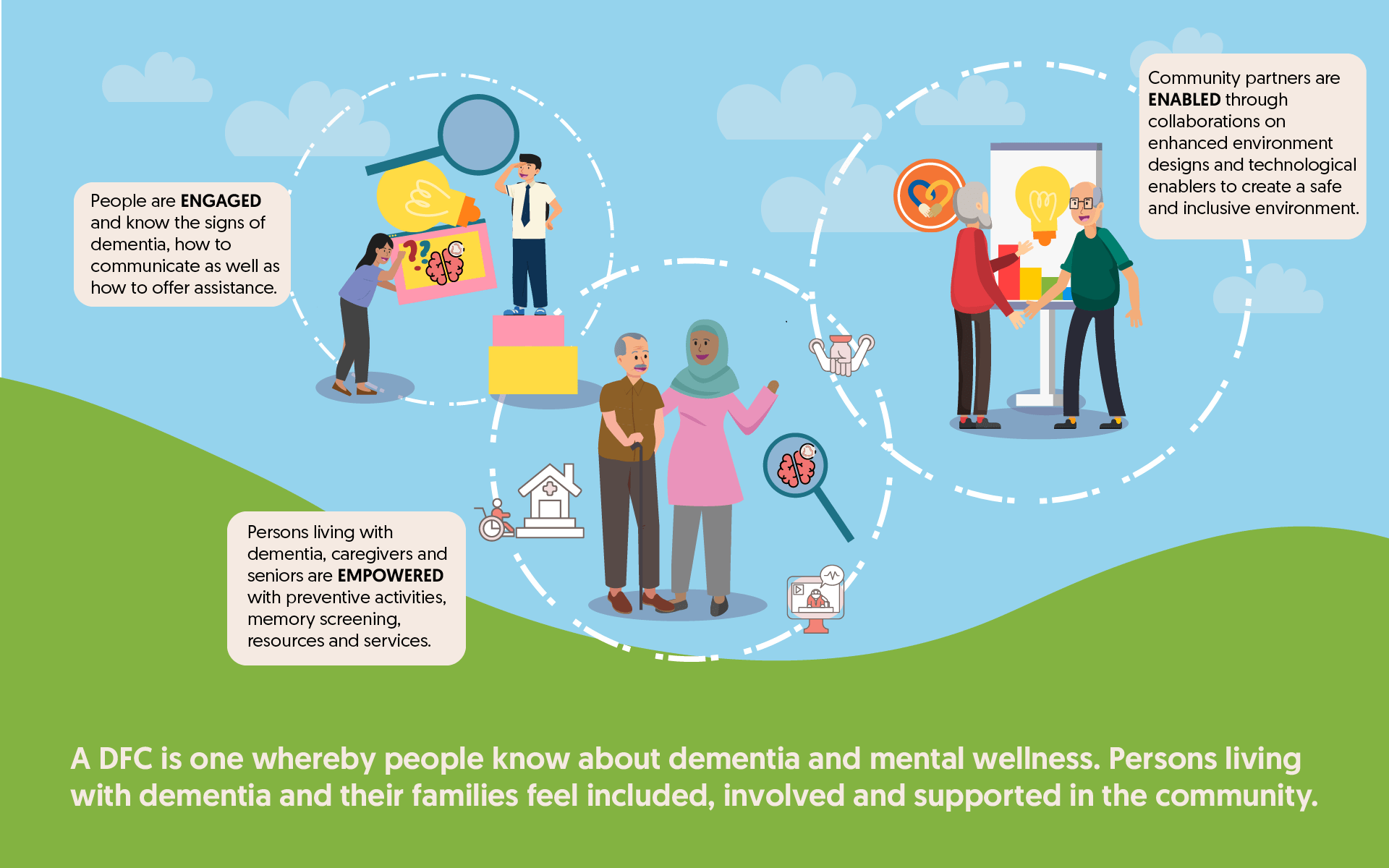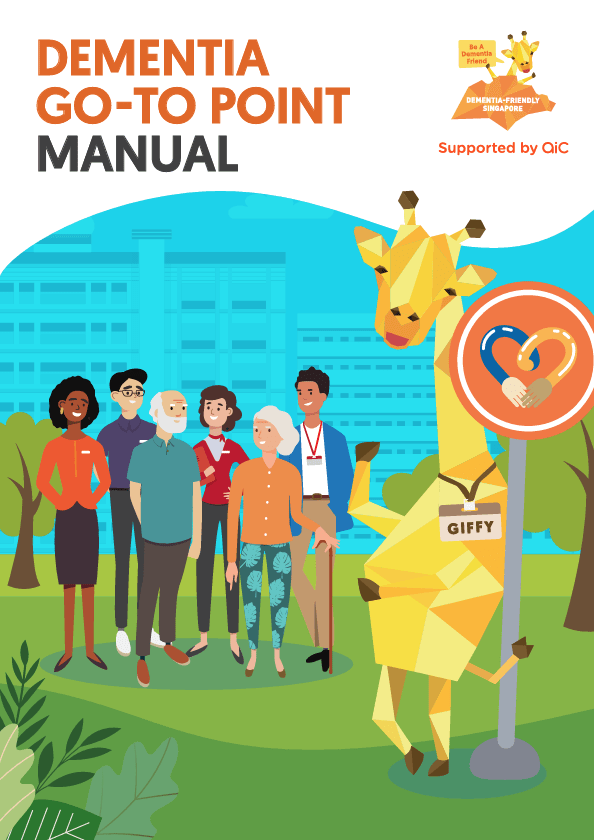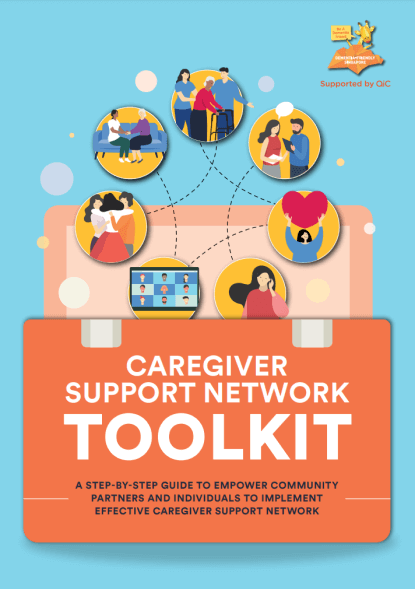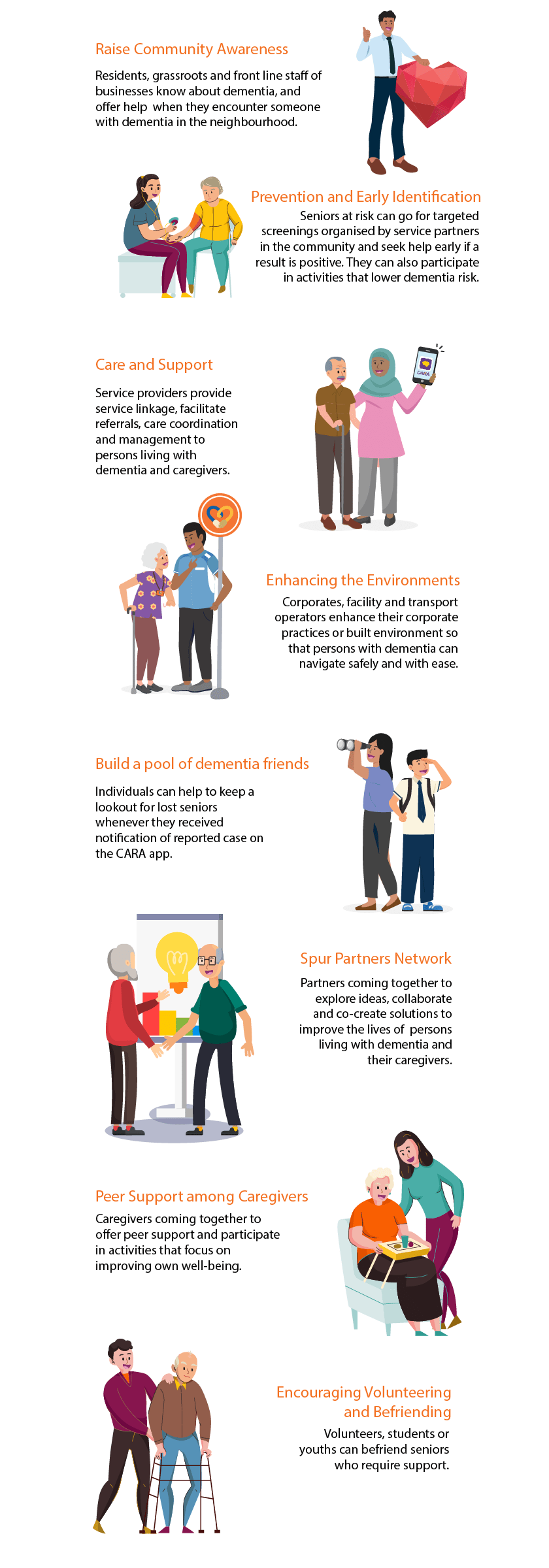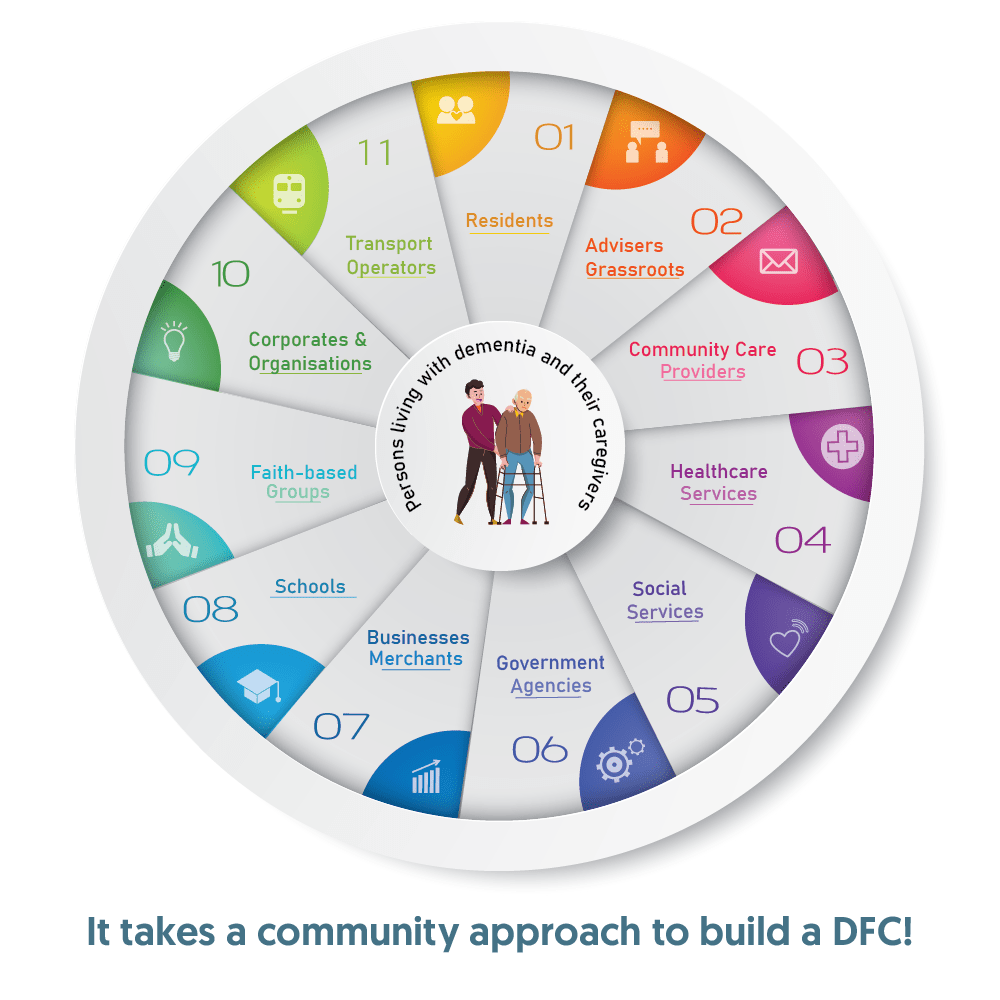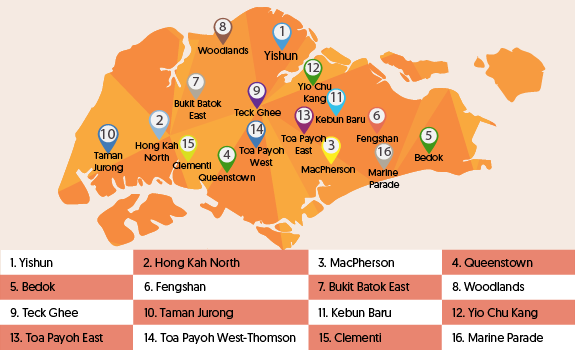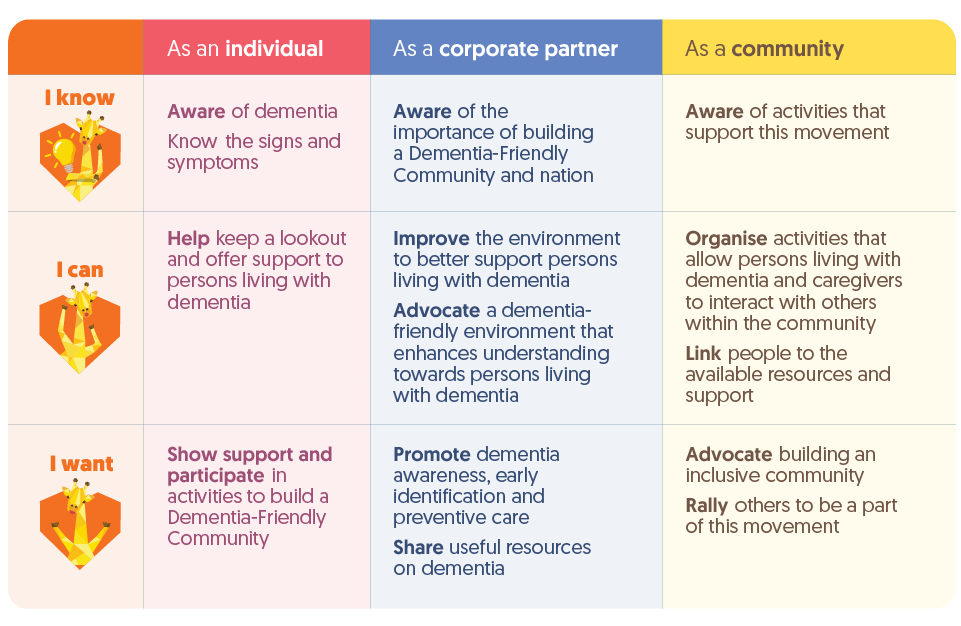
What are the Key Initiatives in a Dementia-Friendly Community?
Dementia Go-To Points (GTPs)
GTPs are located on the premises of organisations which support the #DementiaFriendlySG movement. These community nodes support persons living with dementia and their caregivers through the following functions:
a) Resource Centre
The general public and caregivers can get educational resources and helpful information on dementia here.
b) Safe Return Point
Members of the public can bring persons living with dementia who may appear lost and are unable to find their way home for staff assistance here.
If you find a person living with dementia who appears lost, you may locate the nearest GTP for assistance. Click the banner below to view a list of GTPs in your region.
What is a Go-To Point and how can employees of organisations running the Go-To Points support persons living with dementia at the Go-To Point? Watch the video to learn more.
Setting up a GTP video: https://www.aic.buzz/SetUpaGTP
This manual serves as a reference for employees of organisations in manning the dementia Go-To Points (GTP) to support persons living with dementia in the community. It dovetails the GTP set-up process, role and expectations as well as provides a list of resources in assisting wandering persons living with dementia.
Caregiver Support Network (CSN)
The CSN is another initiative under Dementia-Friendly Singapore to support and connect with caregivers taking care of persons living with dementia, mental health or physical health conditions. CSNs were developed with the intention of enabling caregivers to care for themselves and to become pillars of support for one another.
There are 3 key focus areas, namely Self-care, Peer Support Network and Recognition. We hope that the CSNs can promote awareness of the different needs required to support caregiving as well as encourage building a supportive network whereby community stakeholders can actively play a role in supporting caregivers and their own well-being in the community. Watch the video and download the toolkit to learn more about CSN.
Implementing an effective CSN video: https://www.aic.buzz/SetUpaCSN
Specially designed toolkit to empower individuals in setting up a Caregiver Support Network (CSN) that emphasises self-care, peer support and recognising caregivers’ well-being in the community. It dovetails the CSN set-up process and templates for your use.
Services
In each DFC, there is a community outreach team, also known as CREST, which promotes the DFC, driving the provision of care programmes, mental health and dementia care services.
The following are the CREST teams in the respective DFCs:
DFC | Service Providers |
|---|---|
1. Yishun | Montfort Care |
2. Hong Kah North | REACH Community Services Society |
3. MacPherson | Brahm Centre Ltd |
4. Queenstown | Fei Yue Community Services |
5. Bedok | Montfort Care |
6. Fengshan | The Salvation Army |
7. Bukit Batok East | Singapore Anglican Community Services |
8. Woodlands | AWWA Ltd |
9. Teck Ghee | Allkin Singapore Ltd. |
10. Taman Jurong | NTUC Health Co-operative Ltd |
11. Kebun Baru | Allkin Singapore Ltd. |
12. Yio Chu Kang | AWWA Ltd |
13. Toa Payoh East | Care Corner Seniors Services Ltd |
14. Toa Payoh West-Thomson | Care Corner Seniors Services Ltd |
15. Clementi | Fei Yue Community Services |
16. Marine Parade | Montfort Care |
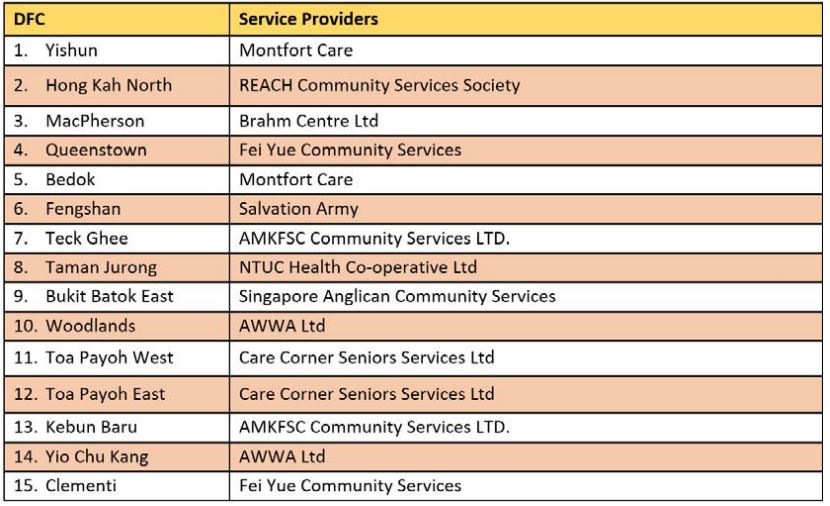
Technology Enablers
CARA Mobile App

CARA is a lifestyle and community digital platform that provides easy access for persons living with dementia and caregivers to connect to an ecosystem of solutions via a mobile application.
An initiative by Dementia Singapore – the national leader in specialised dementia care, CARA stands for Community, Assurance, Rewards and Acceptance – serving as a key touchpoint for members to access personalised support across the journey of living with and caring for dementia.
Supported by AIC and NCSS, CARA is the first dementia membership programme of its kind in the world and is available for download on Apple App Store and Google Play Store. Download is free.
To find out more about the CARA app and benefits from participating partners, visit the CARA website.
How does a DFC Support Persons Living with Dementia and their Caregivers?
How Can a Dementia-Friendly Community Benefit the Community?
Build Community Awareness
- Increase dementia awareness through talks, workshops, event booths and door to door outreach
- Organize awareness workshops for frontline staff and businesses on how to support persons living with dementia
- Recruit students, volunteers and befrienders as Dementia Friends who will help to keep a look out for persons living with dementia and advocate for dementia awareness
- Organize targeted screening for early detection of dementia risk
- Set up dementia Go-To Points to make information readily accessible in the community and act as safe return points for wandering seniors
Support for At-Risk Seniors/ Persons Living with Dementia
- For seniors who are well: Keep active to reduce risk of dementia through preventive activities
- For persons living with mild stage dementia: Engage in meaningful activities to stimulate their cognition which may help to slow down the deterioration of their condition and services linkages for those with needs
- For persons living with moderate or severe stage of dementia: Home and mobile-based support and case network for complex needs
Support for Caregivers
- Create a network that emphasizes self-care, peer support and recognition
- Provision of respite services, information and resources
Safe Neighbourhood for Persons Living with Dementia
- Tap on environmental studies and infrastructure enhancement to make the neighbourhood safe for persons living with dementia
- Tap on technology such as CARA app to rally for community support to keep a look out for persons living with dementia who wander
- Collaborate with businesses who are Dementia-Friendly Partners to create inclusive environment for their staff and customers
Roles of community partners – localised level
- Own and drive initiatives that cater to the community needs
- Initiate discussion and support in co-developing an implementation plan
Roles of community partners – national level
- Form strategic partnership to incorporate and influence policies and practices in creating an inclusive environment
- Sector leaders to co-create solutions to benefit the larger population
Roles of AIC
- Engage and connect like-minded community partners to co-create solutions in the development of DFSG
- Advise on dementia input and potential opportunities
- Share resources
Where are the Dementia-Friendly Communities Located?
Currently, there are 16 DFCs across Singapore. The DFC can be found in each division. A division refers to a ward in a Group Representation Constituency (GRC) or a Single Member Constituency (SMC).
The 16 DFCs, arranged in chronological order are:
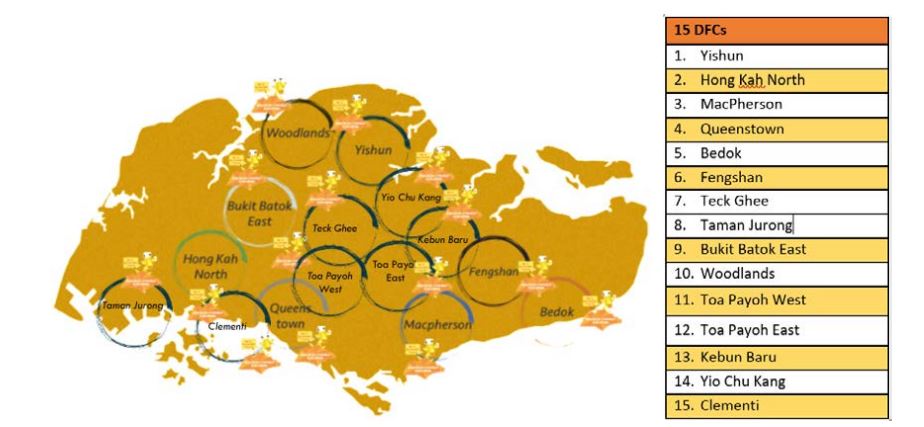
Five Principles of Dementia-Friendly Communities
1. People are aware of dementia and know how to communicate with persons living with dementia
- Residents and community partners know where to seek help, aware of signs and symptoms of dementia and know how to communicate with persons living with dementia
- Include community front liners like grassroots, volunteers, schools, faith-based groups, government agencies, hawkers, businesses, retailers, banks and transport staff
- Build a pool of Dementia Friends who will assist persons living with dementia and keep a look out if they wander off e.g. bring them to Go-To Points (GTPs)
2. Resources exist for early recognition and support for persons living with dementia
- Accessible GTPs in each DFCs to provide information, resources and service linkages
- Resources e.g. collaterals, videos, dementia resource portal (DementiaHub.SG) are readily available for residents, community partners and caregivers
- Dementia screening with follow up is available
3. Persons living with dementia and their caregivers feel supported
- People know about dementia and where to seek help, if needed
- Caregivers are well-supported e.g. part of a support group and have a friend to seek help when needed
- Volunteers are trained as befrienders to provide emotional support
- Flag cases when there are unmet needs and provide service linkage
- Technology is available to help persons living with dementia who wander
- National platform to support caregivers to seek advice, report loss of loved ones with dementia. Public can also call in to inform that they have found reported persons living with dementia
- A dementia membership programme for caregivers and persons living with dementia
- Mobile app which alerts Dementia Friends when a person living with dementia goes missing
4. Businesses and services are respectful and helpful towards persons living with dementia
- Understand the challenges faced by persons living with dementia
- Build physical environment which enables persons living with dementia to move around safely
- Assist persons living with dementia who may need help in finding their way home or bring them to GTPs
- Incorporate dementia awareness training as part of staff training programme
5. Environments are safe and easy to navigate for persons living with dementia
- Able to move around in the neighbourhood safely
- Business/government agencies upgrade their space to make it more senior-friendly e.g. bigger aisle, bigger signage, better wayfinding markers

